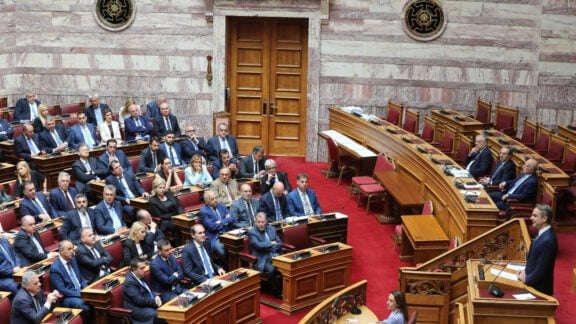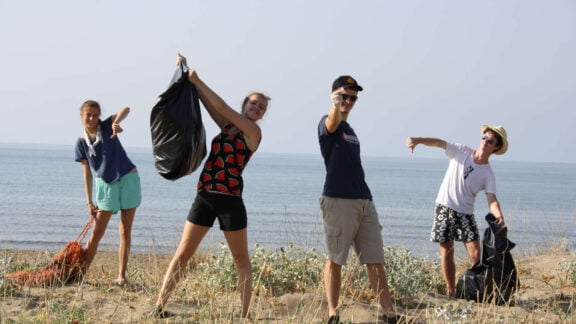Despite warnings about the prevalence of obesity, especially among children, Greece lacks the social education and financial means to tackle the problem, experts say, suggesting that the problem has been exacerbated by the crisis.
“Children’s body weights have increased during the years of the crisis,” Efthymios Kapantais, president of the Hellenic Medical Association for Obesity (HMAO), said in a recent interview. “People are now forced to eat low-cost foods, which are often foods with low nutritional value,” he added.
The 2014 Obesity Update of the Organization of Economic Cooperation and Development (OECD) ranked Greece first among member countries in childhood obesity, with 44 percent of Greek children classed as overweight or obese. Meanwhile, the World Health Organization (WHO) noted a significant increase in overweight and obese 6- to 9-year-olds in Greece in its last European Childhood Obesity Surveillance Initiative (COSI), based on two studies – one conducted prior to and one during the crisis.
Obesity is generally caused by a combination of excessive calories and a sedentary lifestyle. According to WHO, a person is considered obese if their body mass index, a measurement obtained by dividing a person’s weight in kilograms by the square of the person’s height in meters, exceeds 30 kg/m2 and overweight at 25 kg/m2. An obese person is more likely to develop other life-threatening conditions such as Type 2 diabetes, heart disease and certain types of cancers.
Obesity-related complications
Obesity significantly decreases a person’s life expectancy. However, experts say the obese suffer not only somatic, but social and psychological complications as well. Accordingly, experts note a high prevalence of depression among obese people, without knowing whether it is obesity that causes depression or the other way around. Social complications often include isolation, while obese people in general have a harder time finding a romantic partner. In addition, obese people are more likely to have problems finding employment, consequently affecting their income level.
It is crucial to address the social effects of obesity from an early age, as they can have lasting consequences.
“Social issues really affect children because children are very harsh critics. The more uninvolved a child is in social activities, the more he or she will continue to eat unhealthily,” said Kapantais.
“No one becomes obese because they are lazy or stupid. This simplistic, dietetic approach is one of the reasons why we still do not treat this issue seriously,” George Panotopoulos, a specialist in internal medicine, nutrition and obesity said.
In many cases, obesity comes from a genetic predisposition, explained Panotopoulos, who is also a SCOPE European Fellow. “This does not mean that a baby born chubby, boys in the army, after marriage, after divorce, after taking anti-psychotic drugs, or girls after the onset of puberty might become obese due to this predisposition,” he said.
“There is a lot of information out there but unfortunately it is not of good quality. Therefore, people do not have a solid knowledge on nutrition.”
Sound nutritional education, experts say, is of little use to those who do not have the means to apply it. Accordingly, there is a significant correlation between obesity and low income. Poor families, Panotopoulos said, “do not have the means to buy healthy food and healthy food is also expensive.Furthermore, because people [in Greece] now have less money, enrollment in fitness centers has decreased, therefore people have also decreased their physical activity.”
Awareness is key
The government’s capability to raise awareness about this issue has been significantly limited due to the economic crisis. Nevertheless, according to Kapantais, some efforts to raise awareness, particularly among children, can help Greeks make smarter nutritional choices.
“Things can be done to raise awareness through children’s television programs. The more aware people are about this issue, the easier it will be to implement a change,” said Kapantais.
The way to deal with obesity, added Kapantais, is through “changing dietary habits and increasing physical activity.”
“Financial hardship,” the HMAO head said, “should not serve as an excuse for poor nutritional choices. Few people know how to shop smart, neglecting, for example, cheaper, nutrition-rich foods such as sardines and anchovies.”
“Between 2008 and 2013, households in Greece, Ireland, Italy, Portugal, Spain and Slovenia decreased slightly their expenditure on fruits and vegetables,” the OECD said in its 2014 Obesity Update.
When asked what initiatives could be taken at the state level to further educate citizens, Panotopoulos was skeptical about the possibilities of implementing large projects. “The responsibility is now, unfortunately, in the hands of the Greek families, since we cannot expect much from the state,” he said.
State-level initiative needed
Over the years, even before the economic crisis struck, the Hellenic Medical Association for Obesity, a non-profit organization, has made repeated efforts to mobilize Health Ministry officials and develop cooperation on the issue of poor nutrition in Greece.
“We sent a letter to the alternate minister and secretary general of the Ministry of Health, stating that we are available to the government for assistance, but no one has contacted us. Unfortunately, what we see is that several experts are called up, they receive money, and the money gets wasted,” Kapantais said.
“Future funding by the Hellenic Medical Association for Obesity is uncertain due to the current financial crisis. Funding would be more secure if the Ministry of Health and Social Solidarity becomes financially responsible for COSI,” states WHO in its internal assessment of Greece’s organizational ability to carry out the COSI studies.
“The government is not taking advantage of the resources it has at its disposal,” Kapantais said.
Source: Kathimerini








